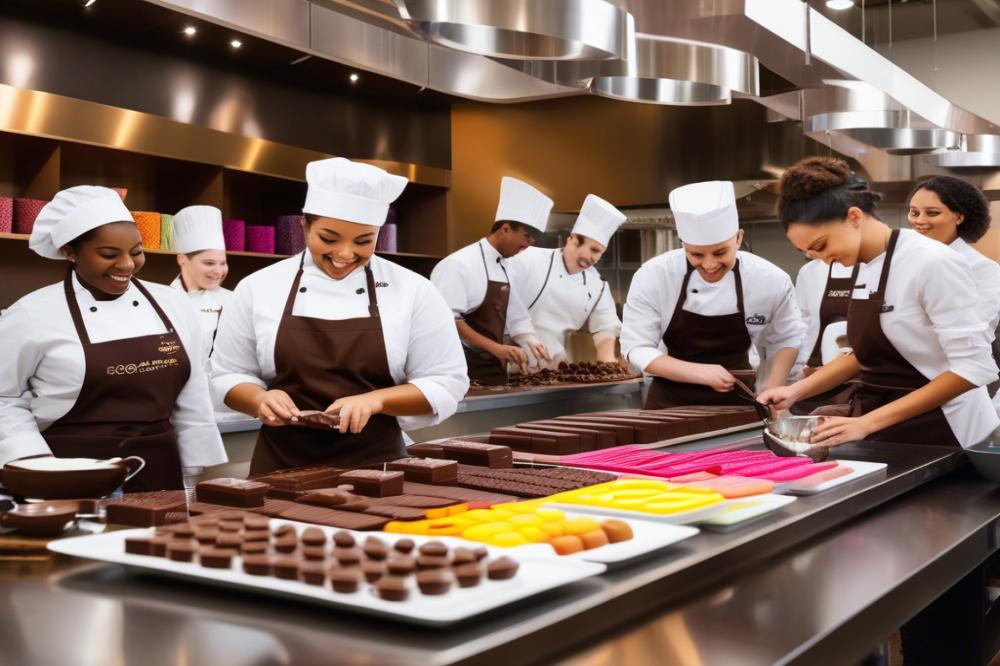Introduction
The chocolate industry has experienced remarkable growth in recent years. Consumers are more curious about quality and variety. This shift has spurred innovation in chocolate craftsmanship and created a fertile ground for new ideas. From bean-to-bar processes to artisanal techniques, chocolate has become a focal point in gastronomy.
Education plays a crucial role in this transformation. Individuals seeking to master the intricate art of chocolate making need access to quality training and resources. Culinary training programs can bridge this gap. By fostering collaboration between professionals and educational institutions, we can enhance chocolate education and elevate the standards of craftsmanship.
Many industries rely on skilled artisans. In chocolate, expertise can create memorable experiences through chocolate tasting and creative desserts. Workshops and hands-on sessions provide valuable learning opportunities. They empower participants to explore chocolate science and improve their skills.
Through professional development initiatives, aspiring chocolatiers can gain practical knowledge. Many culinary schools have specialized programs focused on the pastry arts. These programs allow students to delve into the complexities of chocolate and its various uses. Collaborating with these institutions ensures that future generations of chocolatiers are equipped with the essential skills needed in this evolving landscape.
The Role of culinary schools in chocolate education

Culinary schools play a crucial part in chocolate education. Their programs often focus on both chocolate artistry and pastry arts. Students dive into chocolate craftsmanship, learning how to create beautiful and delicious confections. Courses frequently include chocolate science, which examines the properties and processes of cocoa.
Workshops are a highlight of these educational programs. Through hands-on experiences, aspiring chocolatiers gain valuable skills. They learn how to temper chocolate perfectly and mold it into various shapes. Chocolate tasting also becomes an important part of their training. This exposure helps students distinguish flavors and ingredients.
Professional development is key in the culinary world. Training at a reputable culinary school equips students with the knowledge they need to succeed. They explore the latest techniques and trends in gastronomy. collaboration with industry experts enriches their learning experience.
The curriculum encourages creativity while establishing a strong technical foundation. Students experiment with flavors and textures, enhancing their ability to innovate. The structured environment of culinary training fosters discipline and attention to detail, important traits for any chocolatier.
Overall, culinary schools nurture talent and passion for chocolate. Graduates leave with not only skills, but also confidence. This combination propels them into exciting careers in the culinary industry. Only through rigorous training can aspiring chefs realize their dreams in the world of chocolate.
Innovative Collaborations with Culinary Schools

Partnerships between chocolate companies and culinary institutions are on the rise. These collaborations create opportunities for hands-on experiences. Participants in workshops gain skills in chocolate craftsmanship and pastry arts.
For example, some chocolate brands have teamed up with local schools to offer specialized educational programs. These programs combine the art of chocolate science with practical applications. Students get to learn directly from industry professionals. They also enjoy activities like chocolate tasting, which enhance their appreciation for quality ingredients.
In many cases, these workshops focus on relevant skills for future careers. Culinary training provided through these programs can lead to more competent professionals in the field of gastronomy. Together, these collaborations are vital for nurturing the next generation of chocolatiers. Through such programs, participants have an engaging way to expand their knowledge.
The impact of these alliances extends beyond the classroom. Product development often benefits from fresh perspectives brought in by students. Innovative ideas emerge when aspiring chefs work alongside seasoned chocolatiers. This interplay stimulates creativity and may lead to new trends in chocolate offerings.
Given the rise in demand for artisanal chocolates, staying ahead is crucial. Establishing connections between businesses and educational institutions plays a significant role in this evolution. These partnerships can redefine what it means to be a chocolate professional in today’s market. Moreover, they can inspire educational advancements and foster a love for chocolate in various exciting forms.
Chocolate Tasting and Sensory Education

Chocolate tasting plays a crucial role in understanding flavor profiles and overall quality. Tasting chocolate is not just about enjoying a treat; it’s about exploring the complex flavors that make each type special. By engaging in this experience, individuals learn to identify subtleties in taste and aroma. This process opens doors to deeper appreciation of chocolate craftsmanship.
Through collaboration with culinary schools, aspiring chefs and bakers gain valuable insights into chocolate science. These institutions offer focused educational programs that include workshops specific to chocolate tasting. Students can learn to appreciate rich notes, fruity undertones, and the delicate balance of sweetness and bitterness. Furthermore, these programs help to develop an understanding of what makes high-quality chocolate.
Specialized tasting classes emerge as pivotal parts of culinary training. In these classes, instructors guide students through hands-on experiences. Participants analyze various chocolate samples, learning to distinguish between different origins and methods of production. This promotes not just technical skills, but also fosters a sense of passion for pastry arts. The knowledge gained can inspire a new generation of chocolatiers.
Events centered around chocolate tasting elevate professional development within the culinary community. Workshops can bridge the gap between theory and practice, allowing for real-world experiences. By participating in these tastings, students and educators alike explore innovative gastronomic concepts together. This engagement emphasizes the importance of ongoing education in chocolate, ensuring that traditions and techniques are passed down through generations.
Professional Development Opportunities through Culinary Schools
Collaborating with educational institutions opens doors to essential growth in the chocolate industry. Culinary schools play a pivotal role in this advancement. They offer programs designed to sharpen skills and enhance knowledge in chocolate craftsmanship. Various workshops cater to different aspects of chocolate science, helping aspiring chefs and professionals alike.
Many workshops provide hands-on training. Participants engage in unique chocolate tasting experiences, allowing them to appreciate the nuances of flavor. Skills learned during these sessions can be immediately applied in real-world settings. Such practical learning aids in boosting confidence and competence.
In the realm of pastry arts, these institutions provide an array of continuous education options. From intensive short courses to longer diploma programs, paths are abundant. Both beginner and experienced chocolatiers can benefit from specialized educational programs. Collaboration with skilled instructors fosters an environment conducive to mastering intricate techniques.
Through culinary training programs, students explore the scientific elements of chocolate. They gain insights into the tempering process, how to create ganache, and the principles of flavor pairing. Exposure to these concepts forms a strong foundation for anyone wanting to excel in this sector.
Culinary schools also contribute significantly to gastronomic innovation. By merging traditional and modern practices, they elevate chocolate’s status as an art form. Professionals leave equipped not just with techniques, but with inspiration. This drives creativity and passion in the field of chocolate making.
Future Trends in Chocolate Education
Emerging trends in chocolate craftsmanship are transforming the industry. As more people seek creative experiences, cocoa-based workshops are becoming popular. Interactive chocolate tastings not only engage the senses but also educate participants about flavors and textures. The role of pastry arts is evolving, which highlights the need for specialized techniques that enhance chocolate products.
Educational programs focused on chocolate science will play a crucial role in shaping future chocolatiers. Innovations in production methods demand a deeper understanding of the cocoa bean. Knowledge of fermentation, roasting, and tempering processes will be vital for aspiring chocolatiers. Culinary training centered around these concepts will better prepare students for challenges in the field.
Collaboration between industry experts and schools can lead to unique educational opportunities. Guest chefs and chocolate makers sharing their skills foster an environment of learning. Professional development through workshops will help students stay updated with new techniques and trends. The impact of these experiences cannot be underestimated. Students will leave these programs equipped with knowledge that is directly applicable in the real world.
Sustainability is a growing concern in chocolate education. More courses are incorporating lessons on ethical practices and sourcing methods. As consumers become more aware of the impact of their choices, they seek products that align with their values. Educational programs must adapt by teaching the importance of fair trade and environmental stewardship.
Future gastronomy trends will likely highlight the relationship between chocolate and health. Insights into the nutritional benefits of chocolate could reshape perceptions. This awareness may lead to increased interest in artisanal and health-conscious chocolate alternatives. Therefore, chocolate education must include information about these emerging trends.
In an industry that continues to evolve, the importance of passionate educators cannot be overstated. They inspire the next generation of chocolatiers to think creatively. By providing a solid foundation in chocolate craftsmanship, culinary programs have the chance to lead a new wave in chocolate education. As these trends develop, the future of chocolate looks promising.
Final Thoughts
Collaborating with culinary institutions creates numerous benefits for chocolate education. Students gain hands-on experience that prepares them for the professional world. Industry experts can share practical knowledge and techniques, fostering a deeper understanding of chocolate craftsmanship. This exchange promotes innovation as fresh ideas flow between classrooms and chocolate makers.
Education truly plays a pivotal role in shaping the trends of tomorrow. Advancements in chocolate production and flavor profiles can stem from new learning methods introduced in these educational settings. By nurturing a culture of knowledge sharing, the entire industry can thrive.
Industry professionals should take the initiative to engage with educational programs actively. Outreach can create opportunities for mentorship, workshops, and special projects. When experts connect with future chocolatiers, they ignite passion and provide valuable insights that benefit everyone involved.
Let’s embrace this chance to elevate chocolate education. The next generation of chocolate makers is counting on us to enrich their learning experience. Together, we can inspire creativity and push boundaries in this delicious realm.



